2014 China Tax Law Forum and the 3rd China Tax Lawyer and Certified Tax Agents Forum
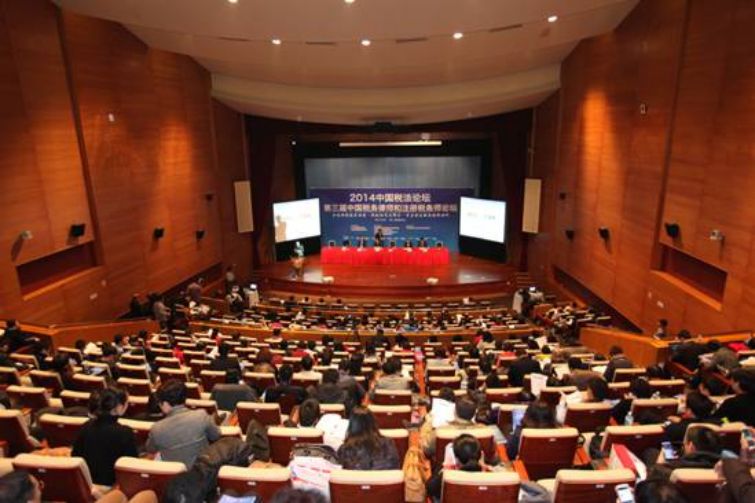
The scene of the forum
On December 27, 2014, "2014 China Tax Law Forum and the Third China Tax Lawyer and Registered Tax Practitioner Forum", which was jointly sponsored by the All-China Lawyers' Association and the China Association of Registered Tax Practitioners, and undertaken by Beijing Hwuason Law Firm, the Research Center of Finance and Tax Law of China University of Political Science and Law, was grandly held in the Third Floor Academic Auditorium of the China National Convention Center in Beijing. The 2014 China Tax Law Forum and the Third China Tax Lawyer and Certified Tax Practitioner Forum" was held in Beijing National Convention Center. The theme of the forum was "Comprehensively Promoting the Rule of Law - Revision of Tax Administration Law - Opening a New Era of Tax Law Service". More than 350 leaders, experts, professionals and journalists from the National People's Congress, the Ministry of Finance, the State Administration of Taxation, the All-China Lawyers Association, the China Association of Certified Public Accountants, institutions of higher education, law firms, tax law firms, enterprises, the news media and other departments and units attended the forum.
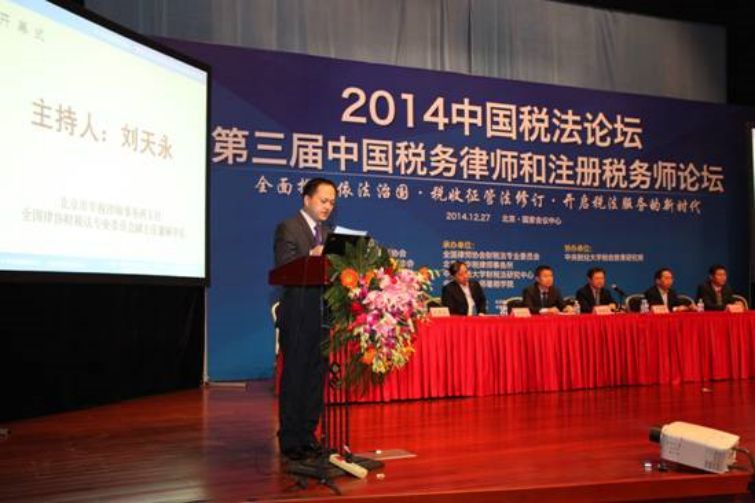
Mr. Liu Tianyong presided over the opening ceremony
The opening ceremony was presided over by Mr. Liu Tianyong, Director of Beijing Hwuason Law Firm, Mr. Hao Ruyu, Vice Chairman of Finance and Economics Committee of the National People's Congress, Mr. Wang Junfeng, Chairman of All-China Lawyers' Association, Mr. Li Linjun, Vice Chairman and Secretary General of the China Association of Registered Taxation Technicians, Mr. Liu Shangxi, Director of the Institute of Fiscal Science of the Ministry of Finance, Mr. Liu Jianwen, Chairman of the China Association of Fiscal Law, and Prof. Shi Zhengwen, Chairman of the Center of Fiscal Law of China University of Political Science and Law, delivered their speeches. The speeches were made by Prof.
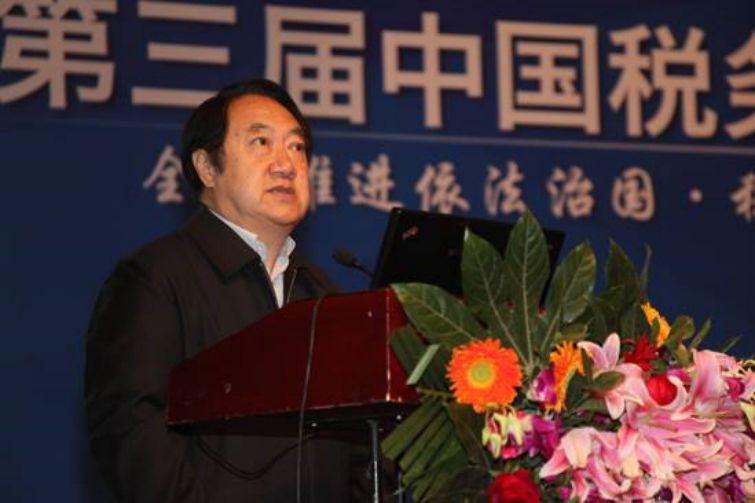
Speech by Director Hao Ruyu
Hao Ruyu pointed out in his speech that it has become a very urgent task to promote the revision of the Tax Administration Law, which is one of the most important contents to implement the principle of tax law. At the same time, he believed that tax lawyers should be fully involved in the process of promoting tax legislation as well as ruling the country according to law. He praised Liu Tianyong, Director of Hwuason Law Firm, and his team for their participation in a series of tax legislation work in recent years, which has produced good social effects. At the same time, he also hoped that the two professions of tax lawyers and registered tax accountants in China could take advantage of this forum to strengthen the cooperation between the professions, especially in the background of the registered tax accountants being canceled the qualification of the profession access, to strengthen the business cooperation with the tax lawyers is an important direction in the future, which can provide a stronger guarantee for the national tax collection and management as well as the protection of the taxpayers' legitimate rights and interests.
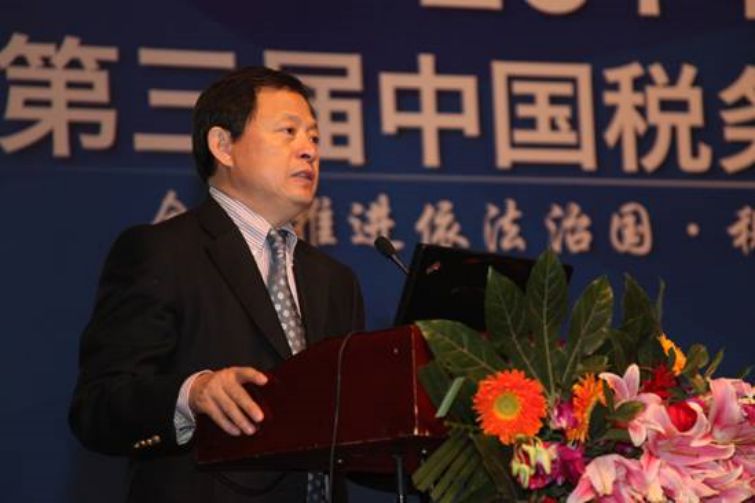
Speech by Mr. Wang Junfeng
Wang Junfeng, on behalf of the organizer of the All-China Lawyers Association, delivered a speech, in which he firstly expressed his sincere welcome to the participants of the forum. In his speech, he put forward four requirements for the development of tax lawyers: tax lawyers should serve the national fiscal and taxation legislation, maintain the fairness and justice of the rule of law, serve the national economic construction, pay attention to the prevention of the industry's own tax law risks in the context of the camp reform and increase, and actively increase exchanges and cooperation with tax accountants and corporate finance personnel.
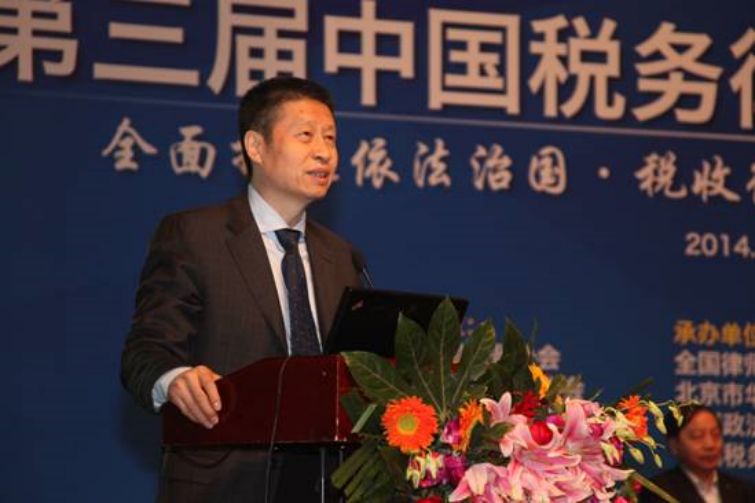
Speech by Mr. Li Linjun, Vice President
Li Linjun delivered a speech on behalf of the organizer, China Association of Registered Taxation Technicians. In his speech, he thanked the organizer of the meeting for the hard work and efforts made for the success of the meeting and put forward his views on the development of registered tax accountants in China. Li Linjun believed that the State Council's issuance of a document to cancel the qualification recognition of registered tax accountants is both an opportunity and a challenge for the registered tax accountant industry in China, and that registered tax accountants in China should seize the opportunity of this reform, strengthen cooperation with lawyers, and improve their own professional skills to serve enterprises and the rule of law on taxation in China. They should seize the opportunity of this reform, strengthen the cooperation with lawyers, and improve their professional skills more deeply to serve the enterprises and the rule of law on taxation in China.

Speech by Mr. Liu Shangxi
On behalf of the Institute of Fiscal Science of the Ministry of Finance, Mr. Liu Shangxi firstly expressed his thanks to the organizers and contractors of the conference. In his speech, Mr. Liu Shangxi fully affirmed the important role played by the Tax Law Forum in promoting the rule of law on taxation in China. He put forward three points of view around the "principle of tax law": firstly, the goal of tax law is to pursue good law and good governance; secondly, tax law is not only the literal word of tax, but also means that all the income of the government should be legal; thirdly, tax law is not only legislation, but also includes the implementation of tax law.

Speech by Mr. Liu Jianwen
In his speech, Mr. Liu Jianwen believes that the interdisciplinary background of tax lawyers plays an irreplaceable role in promoting the development of the rule of law in China, and that tax lawyers shoulder the historical mission of providing assistance for the transformation of China's fiscal and tax system and waving the flag for the protection of taxpayers' rights and interests. In addition, Liu Jianwen also put forward a few views on the rule of law in finance and taxation: first, to the Third Plenary Session of the 18th Central Committee and the Fourth Plenary Session of the 18th Central Committee on the reform of the fiscal and taxation system of the part of the combined view, the two are inseparable sisters; second, the implementation of the principle of tax law, promote the fiscal and taxation law; third, should be tax law limited to a scope, there is a need to have the authorization of the legislation, there is a need to have the authorization to supervise the fourth, the promotion of administration according to law is to promote the rule of law by law, the tax law is to promote the rule of law by law. Promoting administration in accordance with the law is an indispensable part of promoting the rule of law, and the rule of law in taxation cannot be promoted without the restriction of public power; and fifthly, the justice of taxation needs to be improved urgently in order to enhance taxpayers' respect for the tax law.
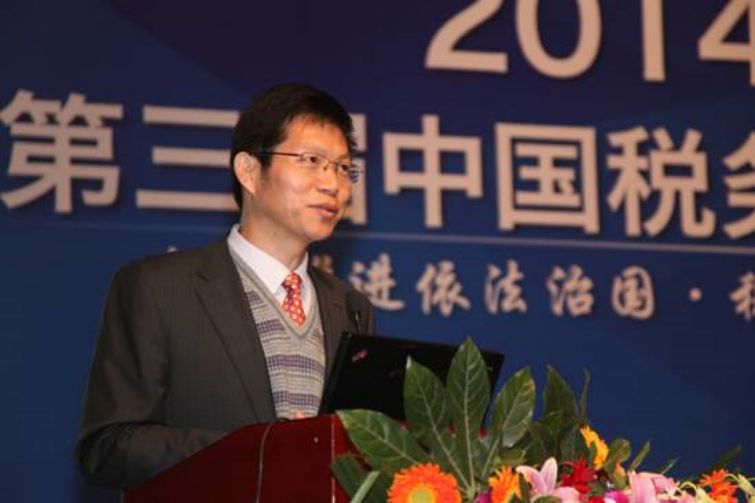
Speech by Prof. Shi Zhengwen
In his speech, Prof. Shi Zhengwen said that the forum was held at the node when the rule of law construction and fiscal and taxation reform in China entered a new period, which promoted and witnessed the opening of a new era of fiscal and taxation rule of law and tax law service. Shi Zhengwen put forward several views on how tax lawyers and tax accountants should respond to the historical opportunities and new challenges provided by comprehensively promoting the rule of law and deepening the reform of the fiscal and taxation system: firstly, lawyers and registered tax accountants should strengthen the study of the tax law and be a high-level tax law expert; secondly, tax and law cannot be separated, and tax accountants and lawyers should strengthen the communication and cooperation of the industry, continuously expand the practice areas and improve the quality of service; thirdly, practitioners should not only focus on the tax law and the tax law service; thirdly, practitioners should not only focus on the tax law and the tax law service. Thirdly, practitioners should not only bury their heads in cases, but also look at the world, deeply understand the historical mission, better safeguard the rights and interests of taxpayers, promote social fairness and justice, and make due contributions to the realization of good laws and good governance.
Liu Tianyong thanked the leaders and guests for their wonderful speeches in the opening ceremony, and made three opinions on the historical mission and future development of China Tax Lawyers Forum, China Tax Lawyers Forum should focus on playing the role of "think-tank" for the reform of the national tax law, and play the role of serving the construction of the rule of law of the national tax system, and play the role of leading the development of the tax lawyers industry. Tax Lawyers Forum should focus on playing the role of "think tank" for the national tax law reform, playing the role of serving the construction of national tax rule of law, and playing the role of leading the development of tax lawyers. According to Mr. Liu Tianyong, tax law scholars, tax officials, tax lawyers, certified tax accountants and enterprise financial personnel should strengthen communication and cooperation in the future to jointly promote the protection of taxpayers' rights and interests as well as the correct implementation of the national tax law, and to jointly promote the construction of the rule of law on finance and taxation in China.
The forum is divided into four speech topics, which are: I. Comprehensively Promoting the Rule of Law and Building Taxation Rule of Law System; II. Revision of Taxation Administration Law and Protection of Taxpayers' Rights and Interests; III. Economic and Social Transformation and Upgrading of Taxation Services; IV. Taxation Service Business Innovation and Capacity Enhancement.
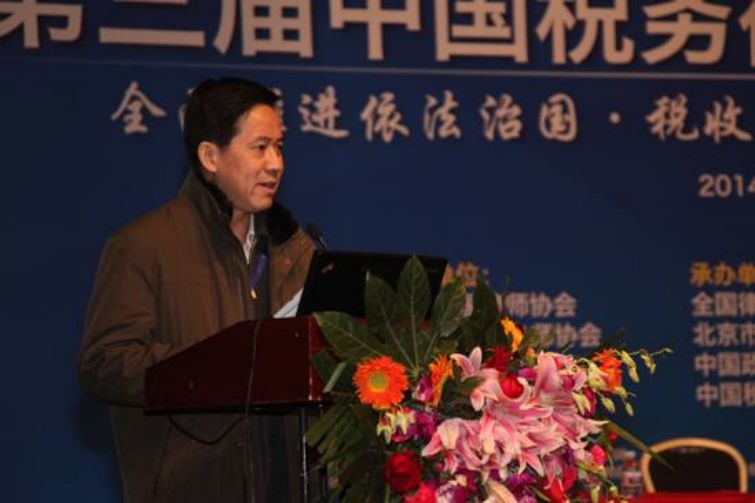
Prof. Zhu Dazhi moderated the speech
In the session of "Comprehensively Promoting the Rule of Law and Building the Rule of Law System for Taxation", Prof. Zhu Dazhi, Professor of the Law School of Renmin University of China, acted as the moderator. First of all, Mr. Zhang Xuerui, Deputy Director General of the Department of Policies and Regulations of the State Administration of Taxation (SAT), made a keynote speech entitled "Comprehensively Promoting the Construction of Taxation Rule of Law System".

Speech by Zhang Xuerui, Deputy Director General
Zhang Xuerui pointed out that to realize the rule of law in taxation, it is necessary to play the leading role of the National People's Congress, make it clear that the right to draft laws is an important part of the national legislative power, eliminate departmentalization, and solve the problem of departmental competition for power; standardize the authorized legislation, and realize the legalization of regulations as soon as possible; and the formulation of policies and laws should reflect the people's expectations, and let the people feel that justice exists, so as to ensure that the laws are effective in their operation.
Prof. Shi Zhengwen, director of the Research Center of Finance and Taxation Law of China University of Political Science and Law, talked about the conditions required for the operation of the rule of law in taxation from five aspects in the light of the Decision of the Fourth Plenary Session of the 18th Central Committee of the Communist Party of China (CPC): standardizing the legislation, strengthening the supervision of the implementation of the Constitution and laws; handing over the basic and comprehensive part of the legislation on finance and taxation to the National People's Congress (NPC) or the State Council's legal system institutions for drafting, but the suggestions of lawyers, tax accountants, experts and scholars need to be widely solicited; and deeply promoting scientific and democratic legislation, emphasizing the enforceability of legislation. legislation, democratic legislation, emphasizing enforceability, and entrusting third-party argumentation; strengthening legislation in key areas; law-abiding by all people, and strengthening the construction of rule of law teams and the expansion of tax law services.
Mr. Wei Guoqing, member of the legislative drafting team of China Association of Registered Taxation Technicians, delivered a keynote speech entitled "Where does a good law come from: some issues of legislation on tax professional services". He believed that good law is not only the substantive and procedural rule of law, but also focuses on the implementation of the law in the procedural rule of law and whether the subject of application is able to understand and apply the law correctly. The working group on tax professional service personnel is of great significance in ensuring the correct enforcement of laws by tax law enforcers and protecting the legitimate rights and interests of taxpayers.
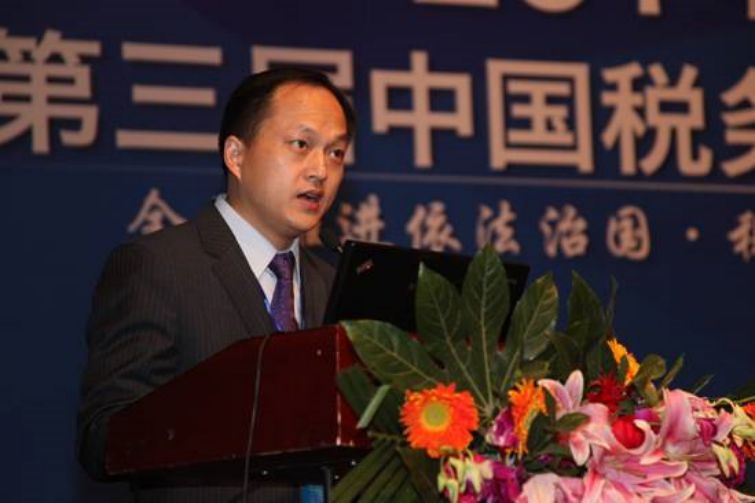
Speech by Mr. Liu Tianyong
The theme of the second session was "Revision of Tax Administration Law and Protection of Taxpayers' Rights and Interests", which was moderated by Prof. Yuan Sengeng from Taxation Cadre College of the State Administration of Taxation (SAT). First of all, Mr. Liu Tianyong, Director of Beijing Hwuason Law Firm, made a speech entitled "Risks and Remedies of Fraudulent VAT Invoices in the Era of Comprehensive 'Reform and Increase'". First of all, he briefly introduced three typical cases of false VAT invoices represented by Huayi recently. Combined with the background of "Camp Reform and Increase", he believed that the cases of false VAT invoices would enter into a period of concentrated outbreaks in the post-"Camp Reform and Increase" era, especially in the financial sector, He believes that cases of false VAT invoices will enter a period of concentrated outbreak in the post-revision era, especially in the financial, real estate and construction industries. Combined with his years of experience in representing cases, he pointed out that enterprises can prevent the risk of fraudulent VAT invoices by improving internal control system, strengthening personnel training, paying attention to key transaction links, avoiding the risk of related transactions, and refraining from touching the minefields, and other specific ways. He also put forward four suggestions to lawyers handling similar cases: (1) the strategy and focus of handling the case should be clear; (2) it should be clear whether it actually results in underpayment of tax; (3) reviewing whether the evidence is lawful and sufficient is the key point; and (4) the cross-application of the tax law and criminal law should be carefully applied.
Wei Bin, Partner of Zhonghui Taxation Firm, shared with the participants the determination of reasonable business purpose, which is the core issue in general anti-avoidance management. He suggested that China can learn from the experience of the United States and other developed countries to improve the rules for determining reasonable commercial purpose in China, and to regulate and limit the discretionary power.
Teng Xiangzhi, Director of the Case Study Center of Finance and Taxation Law of the Chinese Academy of Social Sciences, put forward several suggestions for the revision of China's tax collection and management law with the purpose of protecting taxpayers' rights and interests, including the introduction of a tax assessment system, the improvement of the tax intelligence management system, the abolition of the reconsideration pre-procedure, the abolition of the tax payment pre-procedure, and the granting of the tax authorities with the power of investigation in criminal cases.

Speech by Mr. Liu Zuo, Editor-in-Chief
Liu Ying, Director of Taxation Department, School of Finance and Taxation, Capital University of Economics and Business, acted as the moderator of the session of "Economic and Social Transformation and Upgrading of Taxation Services". In his speech, Liu Zuo, Chief Editor of China Tax News, put forward four points of view on realizing the rule of law in taxation: First, the first and foremost task in promoting the rule of law in taxation is to improve the legal system centered on the Constitution according to the decision of the Fourth Plenary Session of the Central Committee which has just been passed, and to improve the content of the Constitution concerning taxation; second, in the legislation of taxation, the legislation of the national taxes such as value-added tax law and personal income tax law should be handed over to the National People's Congress, but some local taxes such as real estate tax can be considered by the local government, and so on. Third, in Article 56 of the Constitution, it should not only stipulate that "Citizens have the obligation to pay taxes in accordance with the law", but also that legal persons and organizations have the obligation to pay taxes in accordance with the law, and the rights of taxpayers, such as the power of supervision, should be included in the Constitution; fourth, the implementation of the tax law also requires the improvement of supporting measures, such as the budget law. Fourthly, the implementation of tax law also requires the improvement of supporting measures, such as the budget law and the audit law, which should have relevant provisions to complement the provisions of the Constitution.
Mr. Qu Jun, Secretary General of Dalian Registered Taxation Technicians Association, in his speech entitled "Playing the Role of Tax-Related Professional Service Institutions and Promoting the Construction of Taxation Rule of Law", analyzed the present and looked forward to the future of tax-related forensic business in the way of dissecting a sparrow. In his view, registered tax accountants are independent third-party intermediary service organizations with the professional purpose of maintaining the seriousness of tax law, and they are the backbone of realizing tax administration in accordance with the law and protecting the legitimate rights and interests of taxpayers.
Li Hui, President of Beijing Zhongtax Shengda Taxation Firm, made a keynote speech on the continuity of shareholders' rights and interests in China's enterprise reorganization tax system. Li Hui meticulously analyzed the defects and deficiencies in the current legislation of China's corporate restructuring tax system and introduced that China's corporate restructuring tax system legislation is expected to further improve the improvement of the definition of equity payment and increase and enrich the types of triangular restructuring. In terms of the time requirement for continuity of shareholders, he believes that China is not yet in a position to extend the time for continuity of shareholders.
Duan Aiqun, a partner of Dacheng Law Offices, analyzed the institutional arrangements for accounting distinction between equity and debt nature of innovative financial instruments such as preferred shares and tax treatment. He suggested that the State Administration of Taxation Announcement No. 41 and Caijing (2014) No. 13 and the relevant regulations for preferred shareholders be aligned, so that investors of preferred shares and other innovative financial instruments would be treated as equity investments and the dividend income obtained would be treated as tax-free income. He believes that tax lawyers can play an important role in defining the nature of innovative financial instruments as well as in tax collection.
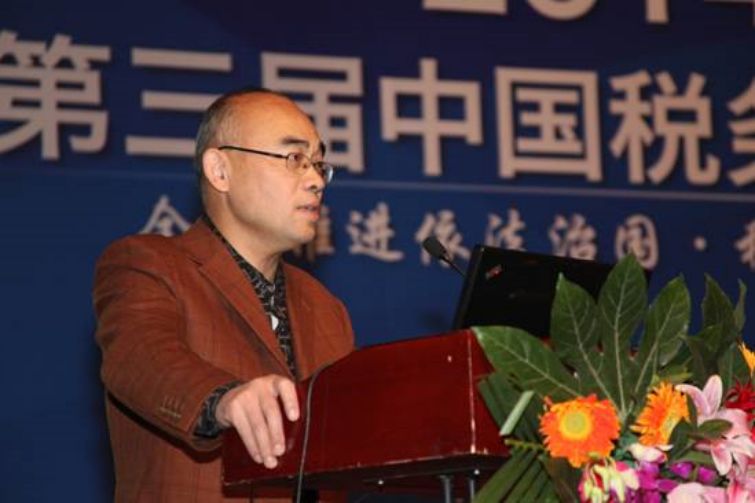
Speech by Mr. Deng Yuanjun
In the session of "Tax Service Business Innovation and Capacity Enhancement", the moderator was Mr. Jia Shaohua, Director of the Institute of Taxation Education of the Central University of Finance and Economics (CUFE). Deng Yuanjun, Director of Beijing Municipal State Taxation Bureau, made a keynote speech on the topic of "Introduction to the Current General Anti-Avoidance Situation in China", in which Deng Yuanjun analyzed several recent anti-avoidance cases handled by him and made an introduction to the domestic and international background, basic connotation, determination criteria and adjustment methods of anti-avoidance based on actual cases, in conjunction with the "Measures for the Administration of General Anti-Avoidance (Trial)" (SAT Decree No. 32) which will be implemented as of February 1, 2015. It also analyzed the tax avoidance structures commonly used by multinational corporations based on actual cases.
Mr. Wang Jiaben, the legal advisor of the State Administration of Taxation, gave his opinion on whether tax authorities have the right to impose administrative penalties on tax-related criminal cases in light of the recent cases he handled. Combined with the cases he has represented in practice, Mr. Wang concluded that the administrative authorities can decide whether to impose administrative penalties according to the results of the judicial authorities in cases that are suspected of constituting a criminal offense, and which have already been sent to the judicial authorities for pursuing the criminal responsibility but have not yet been subject to administrative penalties. administrative penalties are given. After the tax authorities have discovered a suspected crime and referred it to the public security authorities for criminal investigation, they will no longer impose administrative penalties and applications for administrative penalties other than those for the same offense. After a criminal defendant has constituted a suspected crime and has been sentenced to personal and property penalties, the tax authorities shall not penalize the act by imposing a fine.
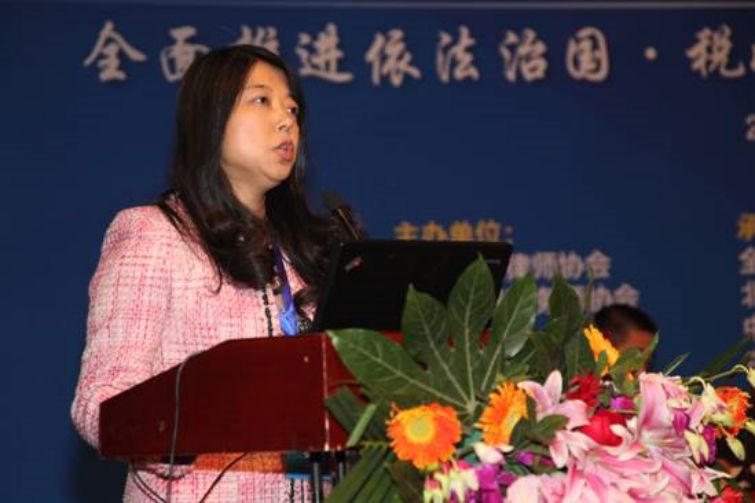
Speech by Ms. Jiang Ying
Ms. Jiang Ying, Tax Managing Partner of Deloitte Touche Tohmatsu Greater China, talked about her expectations and views on the revision of the tax administration law. According to Ms. Jiang, the provisions of the new law on how to reasonably and legitimately protect the rights and interests of taxpayers should be the main focus of the revision; the provisions of the law on tax administration should not only be tailored for the situation in China, but also consider how to coordinate the tax collection in cross-border business; the revision of the law on tax administration should follow the changes of the economic environment; the law on tax administration should give tax firms a clear positioning to ensure that they can better serve enterprises. The revision of the tax administration law should keep pace with the changes in the economic environment; the tax administration law should give tax law firms a clear position to ensure that they can better serve enterprises.
Wei Zhibiao, a lawyer from Beijing Hwuason Law Firm, gave a keynote speech on the topic of "Cleaning and Standardizing Tax Preferential Policies and Innovation of Tax Law Services", firstly, he analyzed the scope of the cleaning of tax preferential policies in the light of the recently issued Notice of the State Council on Cleaning and Standardizing Preferential Policies on Taxation and Other Preferential Policies (Guofa [2014] No. 62). He further proposed that enterprises can still utilize tax preferential policies for tax planning within the legal framework, and he pointed out that tax lawyers can provide services for enterprises in three aspects, namely, contract signing, business structure adjustment and tax dispute resolution, in light of the recent service cases of Huatax. He also pointed out that in the process of tax planning by utilizing tax incentives legally, seven major tax risks should be guarded against, such as changes in tax policies and their non-fulfillment, non-compliance of applications for incentives, filings and preparatory materials, as well as administrative and criminal liabilities.
After the four speeches, Mr. Tu Longli, Director of the Fourth Research Department of the Academic Committee of China Taxation Society, Mr. Zhou Xuzhong, Professor of the Law School of Capital University of Economics and Business, and Mr. Hu Tianlong, Associate Professor of the Law School of Renmin University of China, made wonderful comments respectively. Finally, Liang Wenyong, Director of the Research and Evaluation Center for Legal Education of China University of Political Science and Law, made a comprehensive comment on this forum. He believed that this forum was full of wisdom, and all the guests knew everything and said everything, which formed a flourishing situation of a hundred schools of thought competing with each other and a hundred flowers blossoming, and that China's tax and law circles made their voices heard with the exchange platform provided by this forum, and offered advice and suggestions on the reform of the country's fiscal and tax laws.
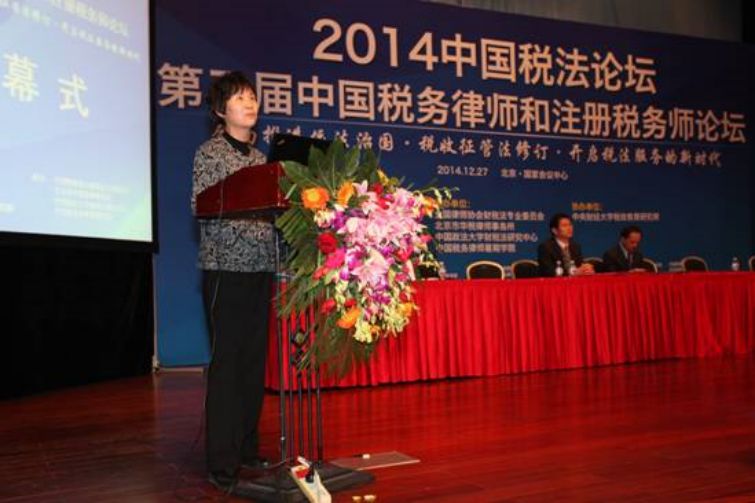
Mr. Quan Fanglou, Vice President, delivered a closing speech
The closing ceremony of the forum was held at 5:00 p.m. on the 27th, with Jia Shaohua, Director of Taxation Education Research Institute of Central University of Finance and Economics, as the moderator. Firstly, Quan Fanglou, Vice President of China Association of Registered Tax Accountants (CARTA), on behalf of the organizing committee, read out the list of winners of the excellent papers of the forum, and 20 people, such as Tu Longli, Huang Jun and so on were awarded with the first, second and third prizes of the paper selection as well as the excellent prizes. Quan Fanglou, Professor Shi Zhengwen, Director of the Research Center of Finance and Taxation Law of China University of Political Science and Law, and Liu Tianyong, Director of Beijing Hwuason Law Firm, jointly issued the award certificates to the winners and took a group photo together. Finally, Mr. Liu Tianyong, Deputy Director and Secretary General of Finance and Taxation Law Committee of the National Lawyers Association, made a closing speech on behalf of the organizers and contractors of the forum, and he believed that the scale and level of the forum had reached the highest level in history, and the results of the papers and the themes of the speeches of the forum were based on the reality and forward-looking, which would provide a useful reference for the future reform of the domestic tax legislation, law enforcement and judiciary.
The rule of law in taxation is a very important part of China's rule of law system. The Third Plenary Session of the Central Committee put forward the implementation of tax law, which pushed the rule of law in taxation to the height of national governance, and the Fourth Plenary Session of the Central Committee put forward one goal, five principles and six tasks, which provide important support for the construction of the rule of law in taxation. The convening of this forum coincides with the deepening reform of the construction of the rule of law in finance and taxation. Tax officials, tax law scholars, tax lawyers, registered tax accountants, and corporate finance personnel exchange ideas and talk about the reform of the rule of law in finance and taxation, which not only summarizes the reform of the rule of law in finance and taxation since the Third Plenary Session of the 18th CPC Central Committee, but also looks forward to the deepening of the reform after the Fourth Plenary Session of the 18th CPC Central Committee Central Committee Central Committee Central Committee Central Committee. At this year's Tax Law Forum, representatives from all walks of life have focused on the revision of the Tax Administration Law, and have made suggestions on promoting the process of China's rule of law in the form of good laws and good governance, as well as providing new ideas and perspectives for the development of tax lawyers and tax accountants. In the future, China Tax Law Forum and Tax Lawyers Forum will continue to explore the major topics and cutting-edge issues in the construction of the rule of law in China's taxation, and better undertake the historical mission of tax lawyers and certified tax accountants to serve taxpayers and promote the process of the rule of law in China's finance and taxation.





